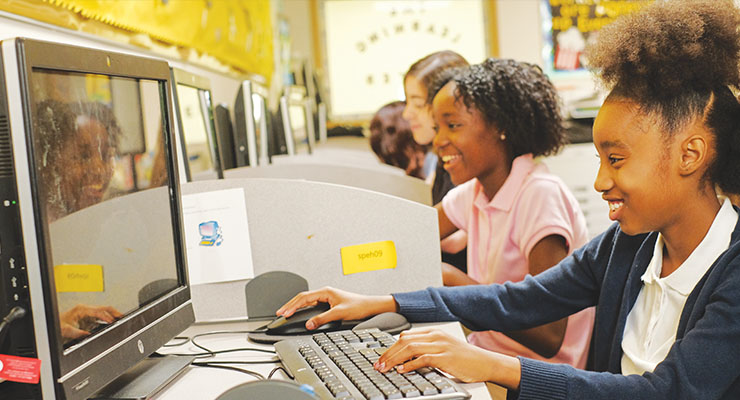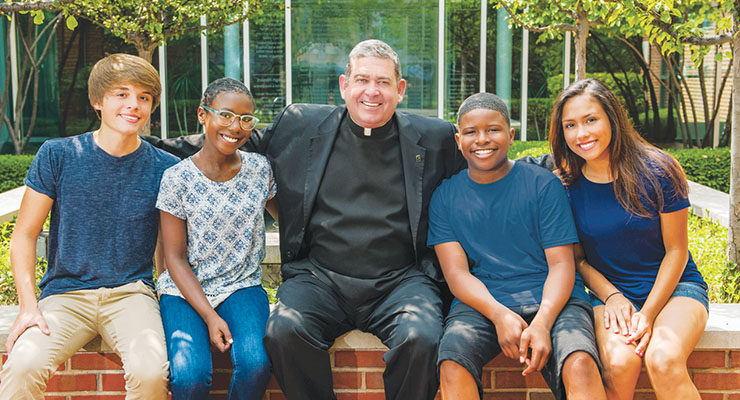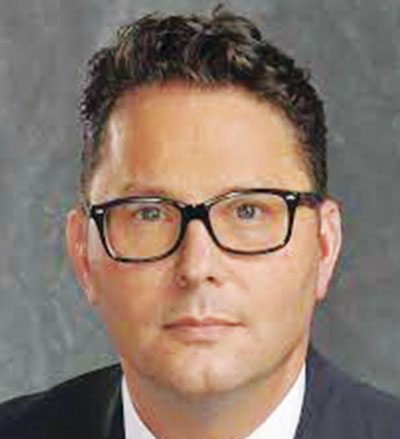By Isi Frank Ativie
Many youngsters in Chicago need a helping hand, especially if they’re in a desperate time of need. For 135 years, Mercy Home for Boys and Girls has provided more than a helping hand by offering a haven and place for kids who seek opportunities for a better future.
Mercy Home has built a reputation for providing a safe and structured home for kids who have experienced adversities and severe trauma. Staff members care for these youngsters 24 hours every day.

Youngsters receive computer education through Mercy Home for Boys and Girls.
“While they’re here it’s not just a place to be safe from the situations they came from, but it’s also a place we’re providing them with the tools they need to build more independent and self-reliant futures,” spokesperson Mark Schmeltzer said. “So, we’re working with them on life skills such as self-regulation, self-care, self-esteem, and improving relationships with peers and adults. Relationships are key here.”
A Roman Catholic priest, the Rev. Louis Campbell, founded Mercy Home in 1887. Once nicknamed the “News Boys’ Home” because the children used to sell newspapers, a job that helped them survive, this situation sparked the idea to house abandoned kids and orphans.
Mercy emphasizes education by enrolling residents in appropriate schools, holding tutoring sessions, and providing other educational programs to help youngsters catch up with their studies; some volunteers stay at the facility once a week to assist kids with homework assignments. These services help staff members learn each child’s level of academic development, which has paid off in recent years, when 100% of high school seniors from Mercy Home have graduated every year.
Mercy has its West Loop Campus for boys and its Walsh Girls Campus in the Beverly community. The West Loop Campus affords young men the opportunity to work at nearby businesses and perform community cleanup projects. The Walsh Campus includes a Craft Cottage in which young women work together to express themselves through art and gain a feeling of sisterhood. That campus also has a garden in which young women learn to grow and harvest their own food. Both campuses have educational and recreational facilities.
Concerning boys and girls, Schmeltzer said, “All young people come to Mercy Home having experienced significant adversity and trauma in their lives, and all need a safe place to live, therapy and healing, life skills to help them build resilience, a good education and career guidance to help them become successful and independent long term, and most importantly, strong, trusting relationships.”
Turning lives around
According to Schmeltzer, graduation is “a really big turnaround in their life. And almost all of them matriculate to the next grade as well. Many of them go on to college, graduate school, and other things.”
Mercy Home also assists youngsters with professional skills to get jobs in the future. Staff organize after-school job programs to build resumes, and many young adults have obtained internships from businesses through Mercy Home.
“That’s where our relationships with companies throughout the city are very important,” Schmeltzer added. “Because they can open their doors and welcome our kids to these learning experiences that will help them…visualize where they want to go in life career wise.”

In addition, Mercy Home teaches youngsters how to handle periods of distress by offering individual therapy sessions, and it runs a community care program that works directly with families to supply any support that they need, including family therapy, job placements, and proper housing. The program always opens its doors for those who still want personal assistance in their lives.
“We’re really committed to these young people throughout their lives,” Schmeltzer said. “It’s sort of a family structure. When you leave your house, you’re grown and you leave, but you’re still part of the family. You can still go back with open arms, and that’s what we try to do for our kids no matter what.”
For youngsters who do not live in the facility, Mercy also runs Friends First, a program in which staff members and local volunteers care for these kids so they can benefit from having good role models in their lives.
Successful alumnus
Mercy alumnus Pat Zamkin stands as an example of how Mercy Home can turn around youngsters’ lives.
Now a financial advisor for Edward Jones investments, Zamkin came to Mercy Home in 1985 as a 15-year-old. Abandoned by his biological mother, as a toddler Zamkin also lost his biological father, who suffered from mental illness. Paternal relatives adopted him at age three, but when Zamkin lost his adopted father to lung cancer, “My adopted mom didn’t want me,” he said. “She would say, ‘I didn’t want you; you were your father’s idea.’”
Arriving at Mercy Home proved a culture shock, as Zamkin had lived in small, south suburban Thornton, IL. He got into a fight over a television remote control his first week and had a frightening moment with a friend from the facility when they had to run from gunshots outside. Yet he quickly realized Mercy Home could be a positive experience.
“It was strange to me that these strangers were so interested in my well-being,” Zamkin explained. “The counselors, brothers, and fathers were complete strangers that tried to help me out. It was really difficult for me to understand because the people that I shared blood with, who were my family, didn’t seem to have the same interest.”

Zamkin eventually left after two years, taking the initiative to become legally emancipated at 17. He worked odd jobs such as dishwasher and groundskeeper and eventually graduated from Thornwood High School, attended Columbia College Chicago and Loyola University Chicago, and became a stockbroker, senior market reporter, business development analyst, and financial advisor, working for the Chicago Board of Trade, CME Group, Olenick, and Edward Jones.
Zamkin now lives in Flossmoor, IL, with his wife of 22 years and their two children. He believes those two years at Mercy Home have affected his life for the better.
“I’ll be honest with you: I don’t know what gave me the strength,” Zamkin said. “I benefited immensely from being there, and it’s something that I still proudly tell everybody. Many times people would ask me about it, and I always take every opportunity to explain to people how important it is and what it meant to me. That’s the grace of God how it all turned out.”
He believes so strongly in Mercy Home that he joined its Ambassadors of Mercy Board.
Like many individuals and businesses, Mercy Home went through a rough patch during the COVID pandemic, having to decrease its residential population for safety reasons by sending some youngsters to temporary homes. Also during this period, however, Mercy managed to help families by mobilizing food donations and providing other emergency relief.
Through all of its trials and tribulations, this sanctuary gives every youngster involved a sense of hope by serving as a pillar that saves many youngsters’ lives and futures.
“Our task is to figure out how to help them on the next step,” said Schmeltzer. “They’re not going to live here forever, so we need to help them access the tools, resources, and inner strengths to succeed after Mercy Home.”
Mercy Home welcomes donations of both funding and supplies, and has programs in which it relies on volunteers as well. Corporate sponsorships also are welcome, as is participation in Mercy fundraising events. The next will be its tenth annual Poker Night on the evening of Thursday, Jan. 26, at the Bank of America Tower, 110 N. Wacker Dr.
President and CEO Rev. L. Scott Donahue, who came to Mercy Home in 1990, said, “While our program has continually evolved to meet the unique challenges of the times, our mission has remained the same for 136 years—to provide a safe home, healing, and tools to build successful futures.”
Fr. Donahue expressed the hope that people would donate to Mercy Home to support children’s education, saying, “Give the gift of a hopeful future. A future filled with success and achievement.”
Mercy Home for Boys and Girls’ headquarters is at 1140 W. Jackson Blvd. Call (312) 738-7560 or log on to www.mercyhome.org. Its YouTube channel is at https://mrcy.hm/3gQiyzS.
